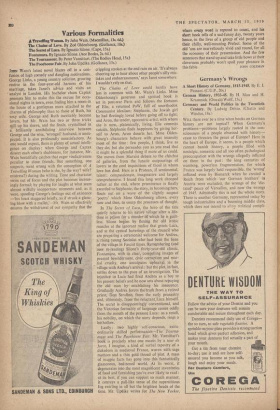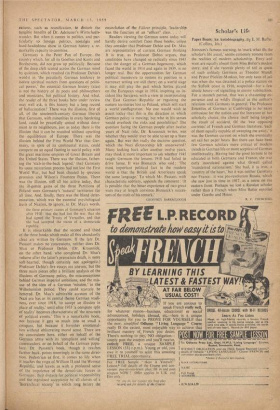Germany's Wrongs
WILL there ever be a time when books on German history are not topical? When Germany's problems—problems largely rooted in the con- sciousness of a people obsessed with history— cease to threaten the peace of Europe? Here in the heart Of Europe, it seems, is a people which cannot banish history, a people filled with nostalgic, romantic and all too often pathological preoccupation with the wrongs allegedly inflicted on them in the past : the long centuries of numbing, powerless fragmentation, for which France was largely held responsible, the 'wrong' inflicted even by Bismarck when he created• a Reich from which 'our German brothers' in Austria were excluded, the wrongs of the 'dic- tated' peace of Versailles, and now the wrongs of 1945. Admittedly this is not the whole story. There is another Germany, represented today by tough industrialists and a booming middle class, which does not intend to allow nolitical compli- cations, such as reunification, to disturb the tangible benefits of Dr. Adenauer's Wirtsehafts- wunder. But when it comes to politics, and par- ticularly to foreign politics, nostalgia and hard-headedness show in German history a re- markable capacity to combine.
Germany is the Peter Pan of Europe, the country which, for all its Goethes and Kants and Beethovens, did not grow up politically. Because of the deep cleft scored across the German mind by quietism, which resulted (in Professor Dehio's words) in 'the peculiarly German tendency to isolate spiritual matters from questions of politi- cal power,' the essential German history (alas) is not the history of its poets and philosophers and musicians, but political history. And what, the reader of the three books here under review may well ask, is this history but a long record of hallucination? There was the illusion, first of all, of the nineteenth-century German liberals that Germany, with minorities in every bordering land, could be peacefully united without detri- ment to its neighbours, just as today there is the illusion that it can be reunited without upsetting the equilibrium of Europe. There wils the illusion behind the First World War that Ger- many, in spite of its continental status, could compete on an equal footing in world policy with the great maritime empires of Great Britain and the United States. There was the illusion, father- ing the 'stab-in-the-back legend,' that Germany by some mysterious process had not lost the First World War, but had been cheated by specious promises and Wilson's Fourteen Points. There was the illusion, still all too active today, that the ill-gotten gains of the three Partitions of Poland were Germany's 'natural' territories for all time. And, finally, there was the bland deter- mination, which was the essential psychological basis of Nazism, to ignore, in Dr. Mau's words, the three primary causes of Germany's situation after 1918: that she had lost the war, that she had signed the Treaty of Versailles, and that she had accepted the status of a democratic republic.
It is remarkable that the second and third of the three books which make all this abundantly clear are written by Germans. If the late Dr. Passant makes no concessions, neither does Dr. Matt or Professor Dehio. (Dr. Krausnick, on the other hand, who completed Dr. Mau's volume after the latter's premature death, is more soft-hearted, though certainly not apologetic.) Professor Dehio's five essays are uneven; but the three main pieces offer a brilliant analysis of the illusions of Germany policy, the misconceptions behind German imperial ambitions, and the mis- use of the idea of a German 'mission,' in the Wilhelminian period. They could scarcely be bettered. Dr. Mau's admirable account of the Nazi era has as its central theme German readi- ness, ever since 1918, `to accept an illusion in place of reality,' until after 1933 'a complete split of reality' becomes characteristic of 'the structure of political events.' This is a remarkable book, not because it gets so much into so small a compass, but because it banishes emotional- ism without obliterating moral sense. There are no concessions here, either on behalf of the German army with its 'compliant- and willing' commanders, or on behalf of the German popu- lace. Dr. Passant's book, though it reaches farther back, points unerringly in the same direc- tion. .Pedestrian at first, it comes to life when it reaches the reign of William II and the Weimar Republic, and leaves us with a profound sense of the impotence of the demoi;ratic forces in Germany, their distaste for political reSponsibility and the ingrained acceptance by all classes of a 'hierarchical society' in which long before the enunciation of the Fiihrer principle, 'leadership was the function of an "officer" class. .
Readers viewing the German scene today will hardly derive comfort from these books, unless they consider that Professor Dehio and Dr. Mau are representative of current German thinking It is true, as Professor Dehio -argues, that conditions have changed so radically since 1945 that the danger of a German hegemony, which faced the world in 1914 and again in 1939, is no longer real. But the opportunities for German political manceuvre to restore its pcisition in a narrower setting are still there; on a world stage it may still play the part which Serbia played on the European stage in 1914, inspiring an in- cident like Sarajevo. with a view to incorporating the East German Republic or regaining the eastern territories lost to Poland, which will start a world conflagration. No one would wish to assert today that this is the direction in which German policy is moving; but who in his senses. would overlook the risks and possibilities? The question facing the German people after twelve years of Nazi rule, Dr. Krausnick writes, was whether they would 'ever be able to set up a State again.' But was this really the decisive question, which the Nazi dictatorship left unanswered? Many looking back after another twelve years, may think it more important to ask whether 1945 taught Germans the lessons 1918 had failed to drive home. It was Bismarck who said 'The most, important political fact in the modern world is that the British and Americans speak the same language.' To which Mr. Passant, with characteristic sobriety, appends the comment : 'It is possible that the bitter experience of two great wars may at length convince Bismarck's succes- sors of the truth of his remark.'
GEOFFREY BARRACLOUGH



















































 Previous page
Previous page